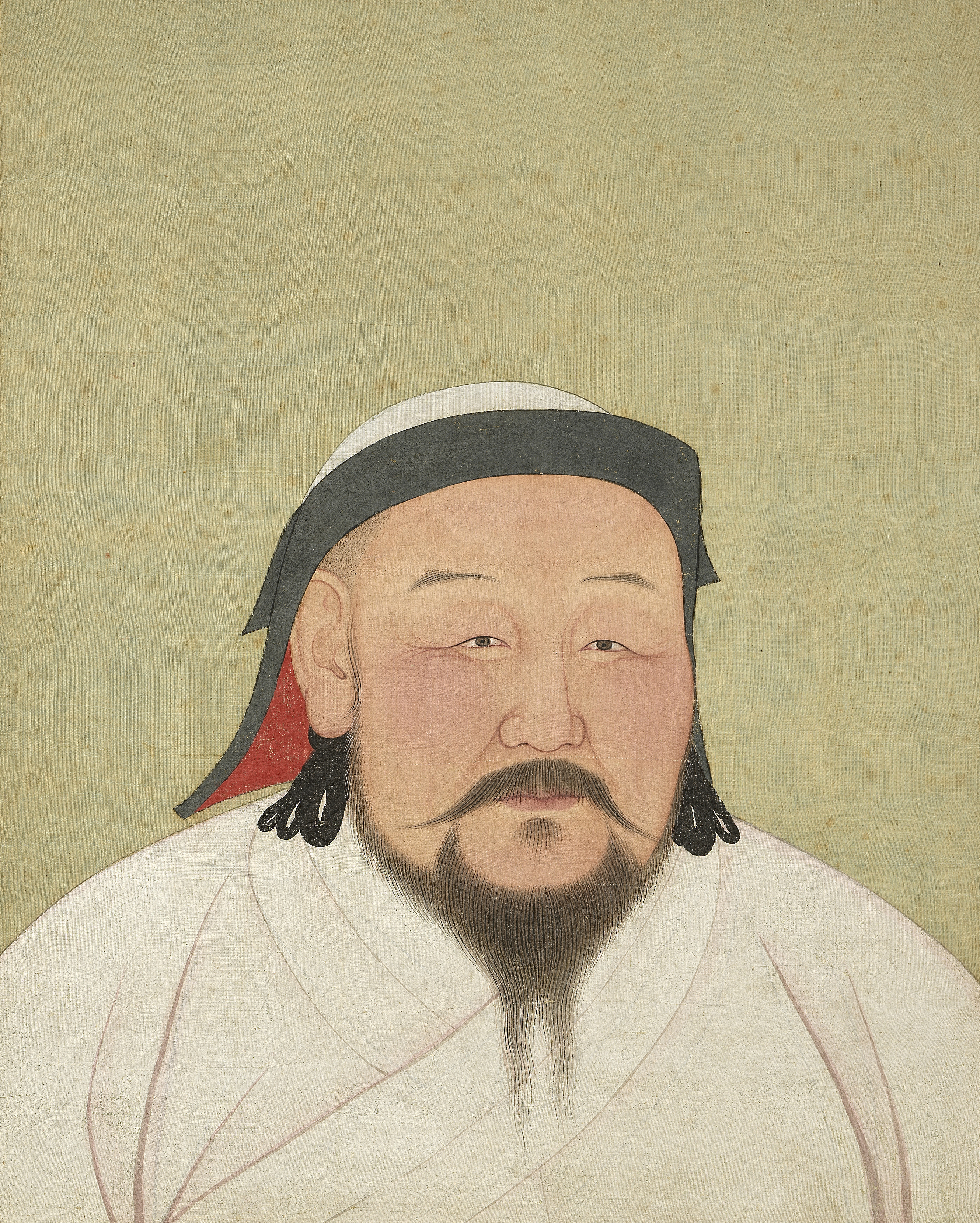
Kublai Khan
Kublai Khan[d] (23 September 1215 – 18 February 1294), also known by his temple name as the Emperor Shizu of Yuan and his regnal name Setsen Khan, was the founder and first emperor of the Mongol-led Yuan dynasty of China. He proclaimed the dynastic name "Great Yuan"[e] in 1271, and ruled Yuan China until his death in 1294.
"Kublai" redirects here. For other uses, see Kublai (disambiguation).Kublai Khan
5 May 1260
- Möngke Khan
- Ariq Böke (claimant)
18 December 1271 – 18 February 1294[c]
23 September 1215
Mongol Empire
18 February 1294 (aged 78)
Khanbaliq, Yuan China
Kublai was the second son of Tolui by his chief wife Sorghaghtani Beki, and a grandson of Genghis Khan. He was almost 12 when Genghis Khan died in 1227. He had succeeded his older brother Möngke as Khagan in 1260, but had to defeat his younger brother Ariq Böke in the Toluid Civil War lasting until 1264. This episode marked the beginning of the fragmentation of the empire.[4] Kublai's real power was limited to the Yuan Empire, even though as Khagan he still had influence in the Ilkhanate and, to a significantly lesser degree, in the Golden Horde.[5][6][7]
In 1271, Kublai established the Yuan dynasty and formally claimed orthodox succession from prior Chinese dynasties.[8] The Yuan dynasty came to rule over most of present-day China, Mongolia, Korea, southern Siberia, and other adjacent areas. He also amassed influence in the Middle East and Europe as khagan. By 1279, the Yuan conquest of the Song dynasty was completed and Kublai became the first non-Han emperor to rule all of China proper.
The imperial portrait of Kublai was part of an album of the portraits of Yuan emperors and empresses, now in the collection of the National Palace Museum in Taipei. White, the color of the imperial costume of Kublai, was the imperial color of the Yuan dynasty based on the Chinese philosophical concept of the Five Elements.[9]
Early years[edit]
Kublai Khan was the fourth son of Tolui, and his second son with Sorghaghtani Beki. As his grandfather Genghis Khan advised, Sorghaghtani chose a Buddhist Tangut woman as her son's nurse, whom Kublai later honored highly. On his way home after the Mongol conquest of Khwarezmia, Genghis Khan performed a ceremony on his grandsons Möngke and Kublai after their first hunt in 1224 near the Ili River.[10] Kublai was nine years old and with his eldest brother killed a rabbit and an antelope. After his grandfather smeared fat from the killed animals onto Kublai's middle finger in accordance with a Mongol tradition, he said "The words of this boy Kublai are full of wisdom, heed them well – heed them all of you." The elderly Genghis Khan would die three years after this event in 1227, when Kublai was 12. Kublai's father Tolui would serve as regent for two years until Genghis' successor, Kublai's third uncle Ogedei, was enthroned as Khagan in 1229.
After the Mongol conquest of the Jin dynasty, in 1236, Ogedei gave Hebei (attached with 80,000 households) to the family of Tolui, who died in 1232. Kublai received an estate of his own, which included 10,000 households. Because he was inexperienced, Kublai allowed local officials free rein. Corruption amongst his officials and aggressive taxation caused large numbers of ethnic Han peasants to flee, which led to a decline in tax revenues. Kublai quickly came to his appanage in Hebei and ordered reforms. Sorghaghtani Beki sent new officials to help him and tax laws were revised. Thanks to those efforts, many of the people who fled returned.
The most prominent, and arguably most influential, component of Kublai Khan's early life was his study and a strong attraction to contemporary Han culture. Kublai invited Haiyun, the leading Buddhist monk in northern China, to his ordo in Mongolia. When he met Haiyun in Karakorum in 1242, Kublai asked him about the philosophy of Buddhism. Haiyun named Kublai's son, who was born in 1243, Zhenjin (Chinese: True Gold).[11] Haiyun also introduced Kublai to the formerly Daoist (Taoist), and at the time Buddhist monk, Liu Bingzhong. Liu was a painter, calligrapher, poet, and mathematician, and he became Kublai's advisor when Haiyun returned to his temple in modern Beijing.[12] Kublai soon added the Shanxi scholar Zhao Bi to his entourage. Kublai employed people of other nationalities as well, for he was keen to balance local and imperial interests, Mongol and Turkic.
Reign[edit]
Great Khan of the Mongols[edit]
The mysterious deaths of three Jochid princes in Hulagu's service, the Siege of Baghdad (1258), and unequal distribution of war spoils strained the Ilkhanate's relations with the Golden Horde. In 1262, Hulagu's complete purge of the Jochid troops and support for Kublai in his conflict with Ariq Böke brought open war with the Golden Horde. Kublai reinforced Hulagu with 30,000 young Mongols in order to stabilize the political crises in the western regions of the Mongol Empire.[30] When Hulagu died on 8 February 1264, Berke marched to cross near Tbilisi to conquer the Ilkhanate but died on the way. Within a few months of these deaths, Alghu Khan of the Chagatai Khanate also died. In the new official version of his family's history, Kublai refused to write Berke's name as the khan of the Golden Horde because of Berke's support for Ariq Böke and wars with Hulagu; however, Jochi's family was fully recognized as legitimate family members.[31]